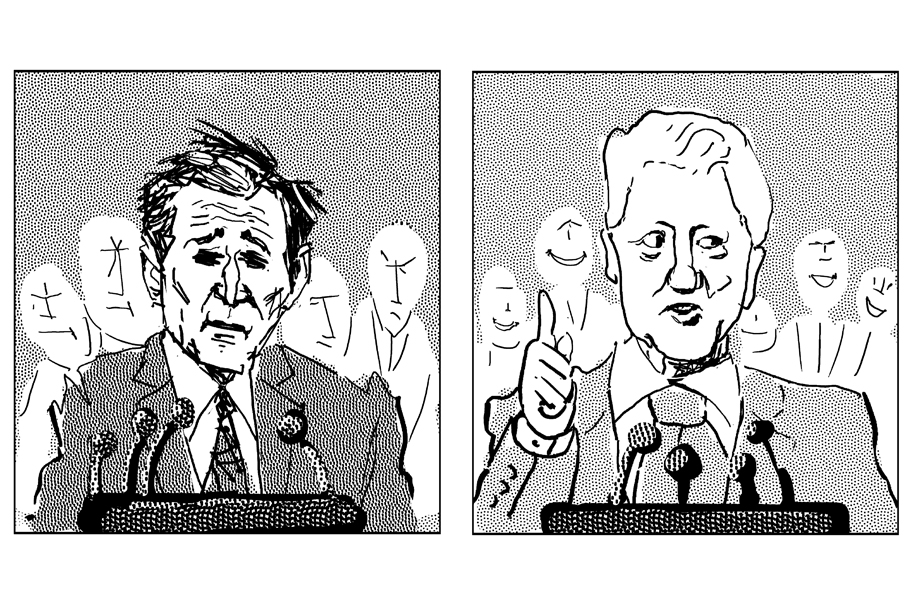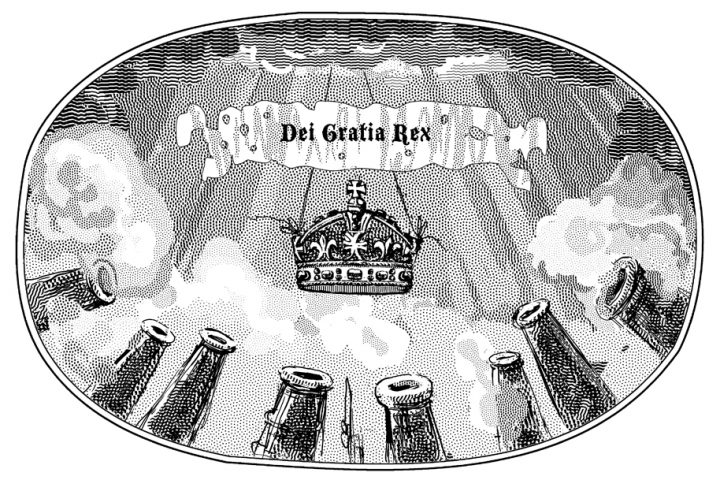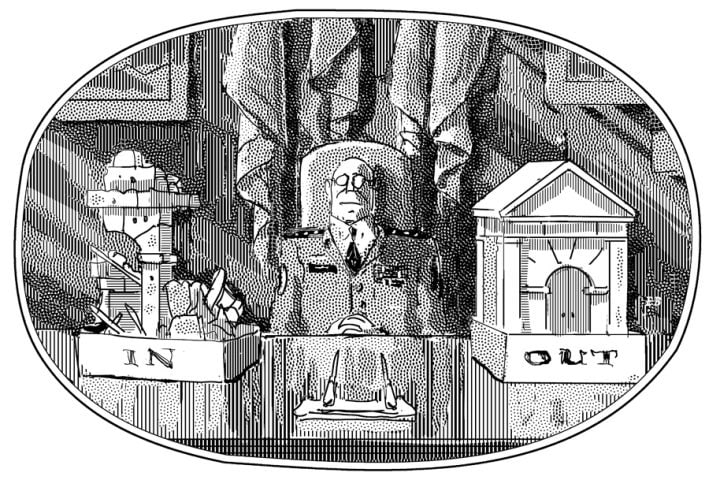Books Reviewed
Twelve or so years ago I heard that well-known political scientist Jackie Mason on the subject of the political rhetoric of the day, specifically on that of George W. Bush and Bill Clinton. In his characteristic Yiddo-staccato accent, Mason, as memory serves, said:
This Bush, oy, what a terrible speaker! He can’t get out a sentence without a hesitation, a stammer, a stutter. He’s ungrammatical. From a subordinate clause he doesn’t know, which doesn’t stop him from butchering even the simplest of sentences. Everything is uh, ooh, ah. Like I say, terrible, a horrible speaker!
Bill Clinton on the other hand—now there’s a speaker! Everything is fluent, mellifluous, it all flows, comes out like molasses. Never any hesitations, faux-pas, smooth, everything just right, perfect.
So what’s the moral of the story? The moral is, you want to be a terrific speaker, you shouldn’t believe a fookin’ thing you say.
Pericles, Cicero, Edmund Burke, Abraham Lincoln, Winston Churchill, and a few other well-known political orators might beg to differ, yet there does seem a fairly high truth quotient to Mason’s analysis, at least when applied to contemporary politicians. Who really fully believes the utterances of our politicians? So much of what they say, after all, doesn’t even originate with them, but are the words of speechwriters and staffers. Did John F. Kennedy ever say anything that Ted Sorsenson or Richard Goodwin or Arthur Schlesinger, Jr., didn’t write out for him? The most memorable political utterances of the past 30 years have come in the form of lies, evasions, and disinformation. One thinks of George H.W. Bush’s “Read my lips” or Clinton’s “I did not have sexual relations with that woman” or Colin Powell—a serious and dignified man —destroying his stellar reputation by unknowingly lying before the United Nations about Iraq’s weapons of mass destruction. In 2004 the young Barack Obama gave a stirring speech before the Democratic National Convention about the essential unity of America and then, as he began his presidency four years later, set out in so many ways to disunite the country. The recent record of political oratory in American politics, let us agree, has not been dazzling.
* * *
The grand oratorical tradition begins mainly with the Romans. Largely eschewing an interest in science—the Romans lifted their science from the Greeks—and not greatly productive in the realm of original art, popular Roman education, as French historian Jérôme Carcopino notes in Daily Life in Ancient Rome (1941),
was a failure; if there was any real Roman education we must not look for it among the elementary teachers, but among the grammarians and orators who to a certain extent provided the aristocracy and the middle classes of Imperial Rome with some equivalent of our secondary and higher education.
This education was training in public argument and utterance: deliberative, forensic, and epeidictic.
Along with military success, oratory was the main route to distinction in Rome. Tacitus, in his Dialogue on Oratory, writes: “For the more powerful a man was as a speaker, the more easily did he obtain office, the more decisively superior was he to his colleagues in office, the more influence did he acquire with the leaders of the state, the more weight in the senate, the more notoriety and fame with the people.” Tell that to the verbally costive Mitch McConnell or to the lubricious Chuck Schumer. In the Rhetoric, Aristotle observes: “it helps a speaker to convince us if we are to believe he has certain qualities himself, namely, goodness, or goodwill to us, or both.” Tell that to the entire U.S. Congress and the last four presidential administrations.
The low quality of political oratory in our day doubtless has a lot to do with the electorate’s combined impatience with complexity and taste for blatancy. The phenomenon is not restricted to the United States. From England a friend of mine writes that “the country seems to be going mad, with a clear chance of having as our next P.M. a superannuated Trot aged 68 [Jeremy Corbyn] who makes Bernie Sanders look like Mrs. Thatcher.” Here in the United States, of course, we have Donald J. Trump, whose election to the presidency appears to have had less to do with him, a far from attractive human being, than with disgust with business as usual in Washington (the “swamp” and all that). So heterodox has been Trump’s speaking method that he has successfully defied the good sense of Aristotle, who writes that “political oratory affords few chances for those leisurely digressions in which you may attack your adversary, talk about yourself, or work on your hearers’ emotions; fewer chances, indeed, than any other [oratory] affords, unless your set purpose is to divert your hearers’ attention.”
* * *
The subject of Enough Said: What’s Gone Wrong with the Language of Politics? is the extent to which our descent into a lower level of political discourse than anyone can remember is owed to the degradation of political language itself. Mark Thompson is currently the chief executive officer of The New York Times Company, and before that, from 2004 to 2012, was director-general of the BBC. In an earlier day those might have seemed impressive credentials; in our day, such has been the diminishment of the prestige of both institutions, they suggest instead a want of trenchancy and a cause for distrust. But Thompson is rather better than his résumé. His book, an act of intellectual exploration, demonstrates an earnest attempt to be politically disinterested joined with wide learning on a complex subject. Setting out to discover what sent our political life off the rails, he puts language at
the heart of the causal nexus. As much as anything, our shared civic structures, our institutions and organizations, are living bodies of public language, and when it changes, so do they. The crisis in our politics is a crisis of political language.
He cites Thucydides, in the History of the Peloponnesian War, remarking on the breakdown of language as in part responsible for Athens’s descent into tyranny and anarchy; Cato the Younger noting a similar loss of the fundamental meaning of words during the Catiline Conspiracy; and Thomas Hobbes during England’s Civil War sensing that the religious controversies of the time, in Thompson’s words, “had fatally weakened the linguistic common ground on which an ordered state depends.” Is ours another such era, a period where careful language has given way to buzz words, argument to insult, discourse to rivalling prejudices?
* * *
Enough Said provides substantial reason to believe that it is. Much of our contemporary political language consists of buzz words: “death panels,” “affirmative action,” “heartless injustice,” “black lives matter,” “climate change,” “the one percent,” “identity politics,” “the death party” (that would be the Republicans on health care), and so on into the night. What buzz words do, of course, along with divide rooms, is eliminate the need for thought.
Such a linguistic atmosphere goes a fair way to explaining the electoral success of our current president. “Donald Trump’s appeal as a presidential candidate,” Thompson writes, “depends significantly on the belief that he is a truth-teller who will have nothing to do with the conventional language of politics.” Trump himself, of course, has done little more than replace the older buzz words with new ones of his own devising: “fake news,” “crooked Hillary,” “whiny Democrats,” and the rest. He relies on hyperbole (“I love the Mexican people”) and repetition (“The tax cuts will be great. They will be great.”). The tweet, as a form of communication, is nicely set up to highlight buzz words, and Trump may well go down as our first tweeting president, and many—among his enemies and supporters both—hope our last.
How did our political linguistic descent happen? “Over the past three decades,” Thompson writes early in his book, “I’ve watched the current crisis unfold, and in the coming chapters, I’m going to use my own experiences and observations to tell my version of the story of how we got here.” Some lay the blame on the politicians; others on the media; yet others on the new technologies of social media; and still others on the public itself. With so many thumbs having been stuck in this pudding, Thompson is properly skeptical of a single-villain explanation, and over the course of his book investigates all these potential causes, or culprits, though without finally arriving at any single thundering conclusion.
For Thompson two great watershed moments in recent political history were the election in 1979 of Margaret Thatcher and in 1980 of Ronald Reagan. He looks into the rhetoric of both, and finds Thatcher’s wanting and Reagan’s oddly successful.
While Mrs. Thatcher’s speeches are marked, Thompson notes, by “their seriousnessness and willingness to delve deep into the underlying policies themselves,” she failed to establish her own character outside the harsh label of The Iron Lady: “She was what she was…[and] unlike many other modern politicians…her views and her public persona did not change greatly between campaigning and governing, or during her twelve years in office.” In this she failed to realize that the public has become more interested in the appearance of its politicians than in their policies. What Thompson (following Aristotle) refers to as logos, or logical argument, has given way among the public and media to ethos, or demonstration of character.
Reagan grasped this in a way Thatcher failed to do. “He had,” Thompson writes, “an unrivaled command of every register of modern oratory, from the most informal and subversive to the most grandiloquent, and he could move from one to another in a trice.” A master of the media, Reagan “could sense the media’s mood too, knew their appetites and their little ways, and until his faculties began to fail him in the last years of his presidency, he could mesmerize them like a cobra.” No one who witnessed it can forget Reagan’s “There you go again” riposte in his debate with Jimmy Carter, leaving the incumbent president with his tongue out, his pants around his ankles. If Reagan, like every other president of the modern age, used speechwriters, they knew that their job, as Thompson puts it, “was based on a pre-existing style. It was his style. In fact, it was him.”
* * *
With Tony Blair and Bill Clinton, we enter the era of spin. Blair and Clinton represent the smooth operator—the slicker—in politics; everything was under control, not to worry, hakuna matata. At least it would seem so, thanks to a new bag of tricks, from speeches to disinformation to leaks and other forms of media manipulation used to establish what came to be called “the narrative”—a vogue word that, stripped of its false lustre, means little more than the politician’s approved version of the story. Politicians, campaign managers, chiefs of staff, certainly press secretaries became spinmeisters all.
With the advent of spin, political journalism turned nasty, which is to say, adversarial. English journalism, with its gutter press, always tended to be tough on its country’s politicians. Thompson notes that the television journalist Jeremy Paxman’s BBC interviews came to be called “snuff movies for politicians.” In the United States, as late as the John F. Kennedy presidency, the press viewed itself as among what might be called the helping professions. During Kennedy’s three years in office, the media agreed never to photograph the president smoking cigarettes or playing golf; and the upstairs baroque bonkery, though known to all, was of course a subject strictly verboten. (Earlier, the mistresses of Franklin Delano Roosevelt and Dwight Eisenhower went unremarked upon.)
* * *
In American politics this accomodationist spirit changed during the presidency of Lyndon Johnson. More American journalists had gone to university, where they had become liberalized, and their opposition to the war in Vietnam and Johnson’s running of it lent this opposition a strong, some would say stringent, moral tone. Such American journalists as David Halberstam, Seymour Hersh, and Frances FitzGerald won their spurs through adversarial reporting on Vietnam, and stuck them into the hides of all subsequent politicians. By the time of Richard Nixon, a figure of liberal contempt well before he came into the presidency, the adversarial journalist—now known by the honorific title of “investigative journalist”—was a hero of culture. News under the reign of the investigative journalist became, as I heard it formulated by Dan Rather, “any story someone didn’t want known.” What the investigative journalist investigated of course was political skullduggery, and, lucky fellow, he seemed never to be out of work.
Analytic political journalism gave way to adversarial political journalism. Whether conducted by Chuck Todd on the left or Chris Wallace on the right, television interviews with American politicians became chiefly disputational, as the interviewer searched out that misunderstanding, contradiction, or straight out lie—in short, that great gotcha moment. Opinion in cable news and elsewhere, Thompson writes, “has to a significant extent replaced news as its core proposition.” The same of course holds for Facebook, Twitter, and the blogosphere—sheer opinion, little else.
Given the complexity of current public policy, small wonder that political journalists and the public fall back on opinion, nicely backed by those two hardy perennials: prior beliefs and prejudice. (The actual written-out document that is Obamacare, I’m told, runs to no fewer than 2,000 pages; I myself intend to read it my first free weekend in the next life.) Owing to this complexity, in electoral politics two separate rhetorics obtain: that of the campaigner and that of the governing politician.
Barack Obama is perhaps the most obvious example of the two rhetorics, “the change we need” giving way almost overnight to the tight-lipped and sometimes testy managerialism. The word-worlds of Obama the campaigner and Obama the president turned out to be so different that it was almost as if they were twin brothers with contrasting personalities—the electorate twice voting for the passionate rebel, each time finding themselves stuck with a professor who, despite his undoubted intelligence and command of the issues, seemed somehow to have mislaid the unbounded sense of possibility and hope that made him so attractive in the first place.
The complexity of policy, the hardening of positions, the air of general distrust and ideological inflexibility all have made for an ever more divise politics. “In my time as a journalist and editor,” Thompson writes, “I’ve seen compromise itself become a pejorative, and the adjective uncompromising a compliment.” The effect of this, he holds, has been to make “the zone of ambiguity and flexibility…rhetorically unsupportable.”
* * *
Only when coming upon Thompson’s extensive acknowledgments—fully eight pages of them in which he thanks everyone but his mother’s obstetrician—does one become aware that Enough Said had its origin in a lecture series that he gave during a term as visiting professor of rhetoric at St. Peter’s College, Oxford. This explains the division of his book into separate subjects, or chapters, that don’t always quite fit together. A chapter on the incursions of marketing—and market researchers—into the domain of politics, and especially political campaigning, is included. As anyone who writes about political rhetoric in our day must, Thompson supplies a chapter on George Orwell’s most famous—though far from best—essay, “Politics and the English Language.” He quite properly underscores that Orwell would have found the political correctness of our day “repugnant and absurd.” He notes the deficiency in Orwell’s penchant for the short word by holding up those two short-word specialists, Sarah Palin and Donald Trump, both of whom Orwell would have found insufferable. The real enemy for Orwell was the political euphemism: what would have infuriated him was the word “pacification” used to cover “bombing” during Vietnam days, the use of “inner-city turmoil” to cover the breakdown of African-American culture in ours.
Perhaps this is the place to note that Thompson’s own language is not without its occasional imperfections. He uses “intriguing” to mean merely interesting; falls back on “prioritize” and “impactful”; avails himself of the clichés “feedback” and “empathy,” “take” (for view) and “reach out”; and the always improper “seminal,” a word that, in its application as a term of praise, invariably downgrades the power of semen. Only once does he use the politically correct, now alas obligatory, feminine possessive pronoun, as in the sentence: “No one goes to the funeral of a friend wanting to hear an objective list of her strengths and weaknesses.”
* * *
In the realm of the obligatory, if one gives a series of lectures of a dark cast on the state of political language, leading on to the near shattering of the political order, one no doubt feels dutybound to offer a few solutions to the problems one has so starkly formulated. So, after limning the declining public trust in politicians, the rise of hate speech, the spectacle of students using the role of oppressor to oppress free speech, the denigration of rationality in political language in favor of ersatz versions of the authentic, the rise of the anti-politician over the practiced politician, and much more, Mark Thompson shifts into Polonius mode. He calls for the return of objectivity and political impartiality, for the separation of fact from opinion in journalism, for the continued need for serious investigative reporting, for the reform of public journalism (the BBC, PBS, NPR), for the teaching of rhetoric to the young, for “high principles that require risks and sacrifices.” Likening the political situation of our time to a plane gone into a spiral dive, he encourages us to “take a deep breath. Look calmly at the instruments. Straighten the wings.” The thinness of all this advice is a reminder that the one cheering moment in Hamlet is when Polonius gets stabbed.





